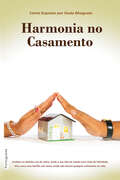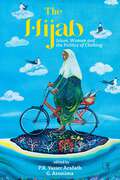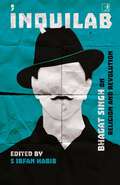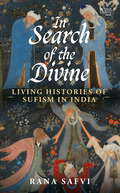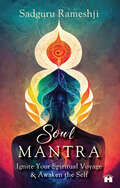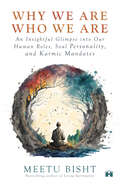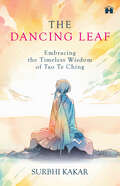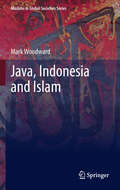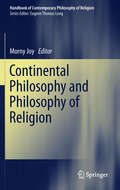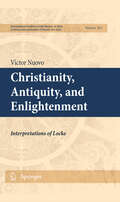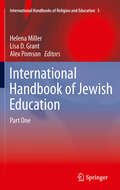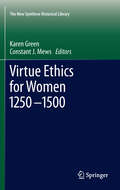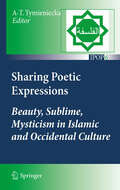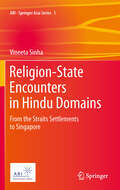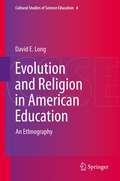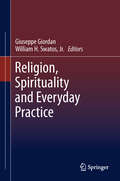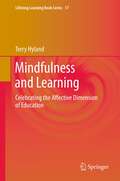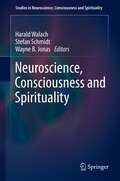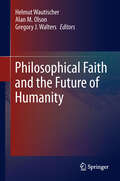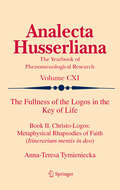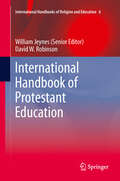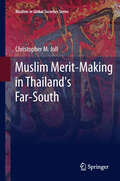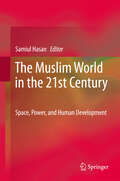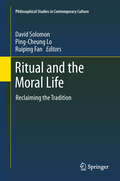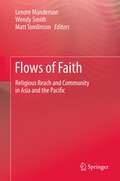- Table View
- List View
Harmonia no Casamento
by Dada BhagwanAo longo da vida, mesmo em lares felizes, é natural encontrar problemas no casamento. Mas, para alguns, pode-se dizer que o relacionamento entre marido e mulher é a própria definição de conflito! No livro "Harmony in Marriage" (Harmonia no casamento), Gnani Purush (personificação do autoconhecimento) Dada Bhagwan fornece dicas de relacionamento espiritual relacionadas à manutenção de um casamento harmonioso. Ele oferece conselhos sobre casamento em resposta a perguntas como: "Como resolver conflitos em meu casamento?", "Como me adaptar ao meu parceiro de casamento?" e até mesmo "Como salvar um casamento?" Param Pujya Dadashri também oferece orientação matrimonial na forma de habilidades espirituais de resolução de conflitos e estratégias de resolução de conflitos. Seus ensinamentos sobre a resolução de conflitos nos relacionamentos familiares são oferecidos no contexto dos desafios comuns e cotidianos do casamento. Em meio à grande quantidade de livros espirituais disponíveis atualmente, este livro será um recurso inestimável.
The Hijab: Islam, Women and the Politics of Clothing
by PK Yasser Arafath G ArunimaHistorically, in India, we have instances of both unveiling and veiling that have been initiated by Indian Muslim women. The early 20th century saw many Muslim women joining the national movement, giving up veiling, feeling this was the only way for them to change their own, and the country's, future. Almost a hundred years later, the hijab continues to be a bone of contention in India, though in very different ways. On one hand, the rape threats that hijabi/non-hijabi women frequently encounter in the cyber world reflect the extreme desperation of the aggravated Hindutva millennials who are made to believe that unveiling Muslim women is their right while a large segment of Indian Muslim women are increasingly convinced that wearing the hijab is their constitutional prerogative. This collection of essays, primarily from India but also with a couple from Bangladesh and Iran, complicates the relationship between Muslim women and the hijab. Moving away from predictable interpretations that see the hijab merely as an instrument of Muslim women&’s oppression, the essays here, from a variety of perspectives including historical, ethnographic, and political, demonstrate that not only have Muslim women covered/ or uncovered their heads for different reasons, but the head cloth itself has had different forms depending on the region or period of history. The essays track the reasons why clothing, especially women&’s attire, is very often a site of contestation and provide ways to hear and understand the ways in which Muslim girls or women make their own sartorial choices. They also offer ways of interpreting the stakes in banning the hijab in different parts of the world, and the implications of the ban on Muslim women, the wider community and the very idea of citizenship itself.
Inquilab: Bhagat Singh on Religion and Revolution
by Syed Irfan HabibExtolled for his extraordinary courage and sacrifice, Bhagat Singh is one of our most venerated freedom fighters. He is valourised for his martyrdom, and rightly so, but in the ensuing enthusiasm, most of us forget, or consciously ignore, his contributions as an intellectual and a thinker. He not only sacrificed his life, like many others did before and after him, but he also had a vision of independent India. In the current political climate, when it has become routine to appropriate Bhagat Singh as a nationalist icon, not much is known or spoken about his nationalist vision. Inquilab provides a corrective to such a situation by bringing together some of Bhagat Singh's seminal writings on his pluralist and egalitarian vision. It compels the reader to see that while continuing to celebrate the memory of Bhagat Singh as a martyr and a nationalist, we must also learn about his intellectual legacy. This important book also makes a majority of these writings, hitherto only available in Hindi, accessible for the first time to the English-language readership.
In Search of the Divine: Living Histories of Sufism in India
by Rana SafviSufism, called the mystical dimension of Islam, is known for its inclusive nature, as well as its ethics of love and compassion, its devotional music, art and architecture. In India's syncretic culture, Sufism developed a distinct character, and harmoniously embraced the Bhakti traditions of North India.Rana Safvi's In Search of the Divine delves into the fascinating roots of Sufism, with its emphasis on ihsan, iman and akhlaq, and the impact it continues to have on people from all communities. Safvi relies not only on textual sources but also on her own visits to dargahs across the country, and the conversations she has with devotees and pirs alike. The book evokes in vivid detail the sacred atmosphere she encounters - the reverent crowds, the strains of qawwali and the fragrance of incense, as well as highlights the undeniable yet often forgotten contributions of women in Sufism. The resulting text is at once modern and a tribute to the rich and textured past.Weaving together fact and popular legend, ancient histories and living tradition, this unique treatise examines core Sufi beliefs and uncovers why they might offer hope for the future.
Soul Mantra: Ignite Your Spiritual Voyage & Awaken the Self
by Sadguru Rameshji&‘It&’s complicated!&’ This is how most of us describe our lives . . . unaware of the fact that it is due to our own thoughts and actions that life seems complex. If not dealt with great care, essential aspects of life such as desires, ambitions, feelings, and relationships can become the reasons for our misery. Soul Mantra discusses these everyday concepts in a detailed and thought-provoking manner. Whether you are a spiritual seeker, a novice, a youngster, or a curious reader in need of new perspectives, this comprehensive spiritual guide will provide answers to all the tricky questions like: • Can an ordinary individual lead an extraordinary life? • Is there an end or purpose to desires or should you just keep running behind them? • Is there a way to be eternally happy without any ups and downs in life? Interspersed with insights and practical tips using real-life instances and anecdotes, this book is relatable to readers of every age, which also gives them the beautiful gift of broadened perspective. This compendium will make you feel as if it has been written, handpicked, and customised just for you.
Why We Are Who We Are: An Insightful Glimpse into Our Human Roles, Soul Personality, and Karmic Mandates
by Meetu BishtWe all have come across moments in life when we ask ourselves, &‘Who Am I?&’ and &‘What&’s my life purpose?&’ But often, we simply stop after the inquiry and spend our lifetimes chasing some dream—financial, personal, or societal—without thinking of the bigger picture. This way, we miss out on uncovering the deeper reality of life, its real purpose, and most importantly, why we are who we are. After her highly successful book, Living Spirituality, Meetu Bisht delivers an insightful text that brings us closer to understanding why we live the life that we live, the true purpose of our unique individual journeys, and the ways in which we can progress and evolve. The book elaborates on concepts such as soul personality and karmic mandates and also explains how our tendencies and certain karmic factors are responsible for our individual life scenarios and destinies. Why We Are Who We Are is relevant for all those who are keen to get a deeper understanding of their inner state and grow spiritually by living a life of greater meaning and purpose and by becoming a higher version of the self.
The Dancing Leaf: Embracing the Timeless Wisdom of Tao Te Ching
by Surbhi KakarWithin the ancient verses of the Tao Te Ching lies a timeless wisdom that has guided generations for centuries. The Dancing Leaf delves deep into the profound teachings of this revered text, providing a deeper understanding of human nature and enduring universal principles.Drawing from the rich tapestry of Lao Tzu&’s legacy, the book serves as a contemporary guide for those seeking to gain clarity on navigating the complexities of existence, cultivating inner peace, and embracing the interconnectedness of all things. Each chapter covers a facet of Tao and provides a practical and applicable roadmap for integrating these edifying insights into daily life.The author skillfully intertwines these age-old verses with her own life experiences, creating a profound narrative that breathes life into ancient philosophies. With personal anecdotes and heartfelt introspection, she becomes both a guide and companion on a transformative journey.All in all, The Dancing Leaf is not just a book; it&’s an invitation to embark on a transformative voyage of self-discovery and personal transformation.=
Java, Indonesia and Islam
by Mark WoodwardMark R. Woodward's Islam in Java: Normative Piety and Mysticism in the Sultanate of Yogyakarta (1989) was one of the most important work on Indonesian Islam of the era. This new volume, Java, Indonesia, and Islam, builds on the earlier study, but also goes beyond it in important ways. Written on the basis of Woodward's thirty years of research on Javanese Islam in a Yogyakarta (south-central Java) setting, the book presents a much-needed collection of essays concerning Javanese Islamic texts, ritual, sacred space, situated in Javanese and Indonesian political contexts. With a number of entirely new essays as well as significantly revised versions of essays this book is a valuable contribution to the academic community by an eminent anthropologist and key authority on Islamic religion and culture in Java.
Continental Philosophy and Philosophy of Religion (Handbook of Contemporary Philosophy of Religion #4)
by Morny JoyThis is the first book that provides access to twelve Continental philosophers and the consequences of their thinking for the philosophy of religion. Basically, in the second half of the twentieth century, it has been treated from within the Anglo- American school of philosophy, which deals mainly with proofs and truths, and questions of faith. This approach is more concerned with human experience, and pays more attention to historical context and cultural influences. As such, it provides challenging questions about the way forward for philosophy of religion in the twenty-first century.
Christianity, Antiquity, and Enlightenment: Interpretations of Locke (International Archives of the History of Ideas Archives internationales d'histoire des idées #203)
by Victor NuovoThe volume will consist of a series of interpretative studies of Locke's philosophical and religious thought in historical context and consider his contributions to the Enlightenment and modern liberal thought.
International Handbook of Jewish Education
by Alex Pomson Lisa D. Grant Helena MillerThe International Handbook of Jewish Education, a two volume publication, brings together scholars and practitioners engaged in the field of Jewish Education and its cognate fields world-wide. Their submissions make a significant contribution to our knowledge of the field of Jewish Education as we start the second decade of the 21st century. The Handbook is divided broadly into four main sections: Vision and Practice: focusing on issues of philosophy, identity and planning -the big issues of Jewish Education.Teaching and Learning: focusing on areas of curriculum and engagementApplications, focusing on the ways that Jewish Education is transmitted in particular contexts, both formal and informal, for children and adults.Geographical, focusing on historical, demographic, social and other issues that are specific to a region or where an issue or range of issues can be compared and contrasted between two or more locations.This comprehensive collection of articles providing high quality content, constitutes a difinitive statement on the state of Jewish Education world wide, as well as through a wide variety of lenses and contexts. It is written in a style that is accessible to a global community of academics and professionals.
Virtue Ethics for Women 1250-1500
by Karen Green Constant MewsThis book locates Christine de Pizan's argument that women are virtuous members of the political community within the context of earlier discussions of the relative virtues of men and women. It is the first to explore how women were represented and addressed within medieval discussions of the virtues. It introduces readers to the little studied Speculum Dominarum (Mirror of Ladies), a mirror for a princess, compiled for Jeanne of Navarre, which circulated in the courtly milieu that nurtured Christine. Throwing new light on the way in which Medieval women understood the virtues, and were represented by others as virtuous subjects, it positions the ethical ideas of Anne of France, Laura Cereta, Marguerite of Navarre and the Dames de la Roche within an evolving discourse on the virtues that is marked by the transition from Medieval to Renaissance thought. Virtue Ethics for Women 1250-1500 will be of interest to those studying virtue ethics, the history of women's ideas and Medieval and Renaissance thought in general.
Sharing Poetic Expressions
by Anna-Teresa TymienieckaA world ever more extensively interlinked is calling out for serving human interests broader and more compelling than those inspiring our technological welfare. The interface between cultures - at the moment especially between the Occident and Islam - presents challenges to mutual understandings and calls for restoring the resources of our human beings forgotten in the struggle of competition and rivalry at the vital spheres of existence. In the evolutionary progress of the living beings the strictly vital concerns, emotions, attributes become sublimed and elevated to the spiritual sphere at which human beings encounter each other and share. Studies presented here bring forth sublimity, generosity, forgiveness, beauty, and are exalting the quest after ciphers and symbols which lead to our sharing the common deepest stream of fraternal reality.
Religion-State Encounters in Hindu Domains
by Vineeta SinhaThe historical and empirical project presented here is grounded in a desire to theorize 'religion-state' relations in the multi-ethnic, multi-religious, secular city-state of Singapore. The core research problematic of this project has emerged out of the confluence of two domains, 'religion, law and bureaucracy' and 'religion and colonial encounters.' This work has two core objectives: one, to articulate the actual points of engagement between institutions of religion and the state, and two, to identify the various processes, mechanisms and strategies through which relations across these spheres are sustained. The thematic foundations of this book rest on disentangling the complex interactions between religious communities, individuals and the various manifestations of the Singapore state, relationships that are framed within a culture of bureaucracy. This is accomplished through a scrutiny of Hindu domains on the island nation-state, from her identity as part of the Straits Settlements to the present day. The empirical and analytical emphases of this book rest on the author's engagement with the realm of Hinduism as it is conceived, structured, framed and practiced within the context of a strong state in Singapore today. Ethnographically,the book focusses on Hindu temple management and the observance of Hindu festivals and processions, enacted within administrative and bureaucratic frames.
Evolution and Religion in American Education
by David E. LongEvolution and Religion in American Education shines a light into one of America's dark educational corners, exposing the regressive pedagogy that can invade science classrooms when school boards and state overseers take their eyes off the ball. It sets out to examine the development of college students' attitudes towards biological evolution through their lives. The fascinating insights provided by interviewing students about their world views adds up to a compelling case for additional scrutiny of the way young people's educational experiences unfold as they consider--and indeed in some cases reject--one of science's strongest and most cogent theoretical constructs. Inevitably, open discussion and consideration of the theory of evolution can chip away at the mental framework constructed by Creationists, eroding the foundations of their faith. The conceptual battleground is so fraught with logical challenges to Creationist dogma that in a number of cases students' exposure to such dangerous ideas is actively prevented. This book provides a detailed map of this astonishing struggle in today's America--a struggle many had thought was done and dusted with the onset of the Enlightenment.
Religion, Spirituality and Everyday Practice
by William H. Swatos Jr. Giuseppe GiordanThe current generation of young adults, at least in the Western world, has shown a marked tendency toward a preference for describing themselves as "spiritual" as contrasted to "religious." This book seeks to examine the possible meanings and consequences associated with this contrast in terms of the similarities and differences that affect those who use these terms with respect to the everyday practices that they themselves employ or believe should follow from being self-defined as "religious" or "spiritual" - or not. The several chapters in this volume take up the religious-spiritual contrast specifically through investigations into practice: In what ways do people who claim to be "religious" or "spiritual" define these self-images as manifest in their own lives? How on a daily basis does a person who considers himself or herself "religious" or "spiritual" live out that self-image in specific ways that she or he can describe to others, even if not share with others? Are there ways that being "spiritual" can involve religion or ways that being "religious" can involve spirituality, and if so, how do these differ from concepts in prior eras (e.g., Ignatian spirituality, Orthodox spirituality, Anglican spirituality, etc.)? We also explore if there are institutions of spiritual practice to which those who term themselves "spiritual" turn, or if the difference implied by these terms may instead be between institutionalized and de-institutionalized expressions of practice, including but not limited to self-spiritualities.
Mindfulness and Learning: Celebrating the Affective Dimension of Education
by Terry HylandIn recent decades, education at all levels has been seriously impoverished by a growing obsession with standards, targets, skills and competences. According to this model, only a circumscribed range of basic cognitive skills and competences are the business of education, whose main role is to provide employability credentials for people competing for jobs in the global economy. The result is a one-dimensional, economistic and bleakly utilitarian conception of the educational task. In Mindfulness and Learning: Celebrating the Affective Dimension of Education, Terry Hyland advances the thesis that education stands in need of a rejuvenation of its affective function - the impact it has on the emotional, social, moral and personal development of learners. Drawing on the Buddhist conception of mindfulness, he advances a powerful argument for redressing this imbalance by enhancing the affective domain of learning. Mindfulness and Learning: Celebrating the Affective Dimension of Education shows how the concept and practice of 'mindfulness' - non-judgmental, present moment awareness and experience - can enrich learning at all levels. Mindfulness thus contributes to the enhanced achievement of general educational goals, and helps remedy the gross deficiency of the affective/emotional aspects of contemporary theory and practice. The author outlines a mindfulness-based affective education (MBAE) programme and shows how it might be introduced into educational provision from the early years to adult education with a view to harmonising the cognitive-affective balance across the system.
Neuroscience, Consciousness and Spirituality
by Wayne B. Jonas Harald Walach Stefan SchmidtNeuroscience, Consciousness and Spirituality presents a variety of perspectives by leading thinkers on contemporary research into the brain, the mind and the spirit. This volumes aims at combining knowledge from neuroscience with approaches from the experiential perspective of the first person singular in order to arrive at an integrated understanding of consciousness. Individual chapters discuss new areas of research, such as near death studies and neuroscience research into spiritual experiences, and report on significant new theoretical advances. From Harald Walach's introductory essay, "Neuroscience, Consciousness, Spirituality - Questions, Problems and Potential Solutions," to the concluding chapter by Robert K. C. Foreman entitled "An Emerging New Model for Consciousness: The Consciousness Field Model," this book represents a milestone in the progress towards an integrated understanding of spirituality, neuroscience and consciousness. It is the first in a series of books that are dedicated to this topic.
Philosophical Faith and the Future of Humanity
by Helmut Wautischer Alan M. Olson Gregory J. WaltersKarl Jaspers, who died in 1969, had a profound impact on 20th-century theology and philosophy. His central thesis called for, among other things, a de-centering of philosophy from its Eurocentric roots and a renewal of its dialogue with other traditions, especially Asian ones. This collection of essays includes unpublished work by Jaspers himself as well as testimonies to his life and career by colleagues, associates, and translators, some of who knew Jaspers personally. Readers will also find commentary and interpretation by researchers who have explored Jaspers' work for decades, and a biographical account of Jaspers' student Leonard Ehrlich, who handled much of Jaspers' English translation. The book interrogates Jaspers' conceptions of 'philosophical faith', his philosophy of communication, and the prospects for world philosophy in the future. Focusing on philosophical faith, it assesses Jaspers' interpretations of key philosophers such as Kant, Hegel, Schelling, Kierkegaard, Nietzsche, and Rosenzweig, as well as examining his personal relationships with Bultmann and Heidegger. Contributors also look at Jaspers' philosophies of religion and history, his hypothesis of the 'axial age' (Achsenzeit), and his contributions to metaphysics, periechontology, and economics. Finally, chapters cover Jaspers' philosophy of communication and world history. The latter are informed by a burgeoning interest in Kantian 'Freiheitphilosophie' that influenced Jaspers, as well as concerns over the future of humanity. These concerns in part account for Jaspers' growing popularity in the Middle East, Eastern Europe, Central/South America, and Asia. Also included are lucid clarifications of the difference between religious and philosophical faith, and the relevance of certainty, trust, and communication for a future of mankind. Trained as a psychiatrist, Jaspers practiced this profession before becoming a philosopher and thus had a keen insight into the workings of the human mind even as he challenged the philosophical establishment of his time. It is perhaps this depth to his background that adds to the contemporary relevance of his work.
The Fullness of the Logos in the Key of Life
by Anna-Teresa TymienieckaThis highly personal account of a lifetime's spiritual and philosophical enquiry charts the author's journey of faith through contemporary culture. Distinguishing between what she posits as the 'universal' and the 'rhapsodic' logos, Tymieniecka interrogates concepts as varied as creativity and the media, joy and suffering, and truth and ambiguity. She contemplates the possibilities and limits of communication between human beings, and outlines what she calls the 'transnatural destiny' of the human soul. The book asserts that unlike theory, which unfolds a logical continuity, and unlike dialogue, which is directed sequentially upward toward intellectual conclusions, the mode of reflection of the 'rhapsodic logos' imposes no limits or caps upon its understanding. Instead, the 'logoic' flow interlaces the rhapsodic cadences of our reflections on reality, in all their innumerable fluctuations, and sifts them to mold the intimate mind/soul inwardness that we experience as faith. The radiative meditations of this 'rhapsodic logos' weave their way through the entanglements of the mystery of incarnation, the constitutive archetypes, the inwardly sacred, the transnatural destiny of the soul, and finally ascend the rhapsodic scales toward culminating faith in the Christo-Logos.
International Handbook of Protestant Education
by David W. Robinson William JeynesSince their earliest days, institutions providing a Protestant education have always been respected and sought-after for their rigor and relative freedom from dogma--and despite today's secularism and plurality, they remain so. This international handbook is the ultimate companion to protestant schooling worldwide. Its 39 chapters form the most comprehensive and wide-ranging treatment of the subject yet available, addressing Protestant education on all six inhabited continents and featuring the perspectives of leading authorities and public figures. The contributions cover in detail not only the facts and features of Protestant schooling in sundry nations, but also integrate a range of themes common to them all, themes so vital that they are of central concern to Christians around the world and of whatever denomination. Some of these topics are school choice, globalization, Bible pedagogy and character education, the fine arts, parental involvement, and the rise of Christianity in previously inaccessible locations such as China. The handbook's stellar list of authors is a Who's Who of authorities on the subject and includes a renowned American evangelical, a former historian of the US House of Representatives, and White House consultants responsible for framing legislation. The many contributors from outside the USA are leading academics conducting seminal research on numerous topics in the field. Both exhaustive and authoritative, The International Handbook of Protestant Educationwill be an invaluable asset to educators, ministers, parents, policy makers political leaders of any denomination--or none.
Muslim Merit-making in Thailand's Far-South
by Christopher M. JollThis volume provides an ethnographic description of Muslim merit-making rhetoric, rituals and rationales in Thailand's Malay far-south. This study is situated in Cabetigo, one of Pattani's oldest and most important Malay communities that has been subjected to a range of Thai and Islamic influences over the last hundred years. The volume describes religious rhetoric related to merit-making being conducted in both Thai and Malay, that the spiritual currency of merit is generated through the performance of locally occurring Malay adat, and globally normative amal 'ibadat. Concerning the rationale for merit-making, merit-makers are motivated by both a desire to ensure their own comfort in the grave and personal vindication at judgment, as well as to transfer merit for those already in the grave, who are known to the merit-maker. While the rhetoric elements of Muslim merit-making reveal Thai influence, its ritual elements confirm the local impact of reformist activism.
The Muslim World in the 21st Century
by Samiul HasanIslam is not only a religion, but also a culture, tradition, and civilization. There are currently 1.5 billion people in the world who identify themselves as Muslim. Two thirds of the worldwide Muslim population, i.e. approximately a billion people, live in forty-eight Muslim majority countries (MMC) in the world- all of which except one are in Africa and Asia. Of these MMCs in Africa and Asia, only twelve (inhabited by about 165 million people) have ever achieved a high score on the Human Development Index (HDI), the index that measures life expectancy at birth, education and standard of living and ranks how "developed" a country is. This means that the majority of the world's Muslim population lives in poverty with low or medium level of human development. The contributions to this innovative volume attempt to determine why this is. They explore the influence of environment, space, and power on human development. The result is a complex, interdisciplinary study of all MMCs in Africa and Asia. It offers new insights into the current state of the Muslim World, and provides a theoretical framework for studying human development from an interdisciplinary social, cultural, economic, environmental, political, and religious perspective, which will be applicable to regional and cultural studies of space and power in other regions of the world.
Ritual and the Moral Life
by Ping-Cheung Lo David Solomon Ruiping FanIn the twentieth century, in both China and the West, ritual became marginalized in the face of the growth of secularism and individualism. In China, Confucianism and its essentially ritualistic comportment to the world were vigorously suppressed during the Cultural Revolution (1966-1976) under Mao Zedong. But de-ritualization already took place as a result of the Chinese Revolution of 1911 under Sun Yat-Sen. In the West, while the process of de-ritualization has been generally more gradual, it has been nonetheless drastic. In contrast to this situation, this volume investigates the crucial role ritual plays in constituting the human understanding of their place in the cosmos, the purpose of their lives, and imbues human existence with a more complete sense of meaningfulness. This volume presents the work of philosophers from both China and the West as they reflect upon the constitutive role that ritual plays in human life. They reflect not only on ritual in general but also on specific Confucian and Christian appreciations of ritual. This provocative volume is a beacon of warning to Western philosophers, who think they have graduated from the trappings of ritual, and a beacon of hope for Eastern thinkers, who wish to avoid cultural fragmentation. The Editors, both Eastern and Western, have together created a seamless work that not only introduces ritual, but advances an argument for the contribution that ritual makes to cultural renewal. This volume is a work of philosophical thinking about ritual doing, but challenges those who think to realize that the salvation of philosophical thinking rests in the particularity and contingency of ritual doing. Let us hope this volume is widely read, for it points to that which might renew the West. - Jeffrey P. Bishop, Saint Louis University
Flows of Faith
by Lenore Manderson Matt Tomlinson Wendy SmithUnique local transformations of the practice of established religions in Asia and the Pacific are juxtaposed with the emergence of new religious movements whose incidence is growing across the region. In Flows of Faith, the contributing authors take as their starting point questions of how religions manifest outside their cultural boundaries and provide the basis for new social identities, political movements and social transformations. With fresh insights into the globalization of beliefs, their local inflections, and their institutionalization, the authors explore how old and new religions work in different settings, and how their reception and membership challenge orthodox understandings of religion and culture. The chapters - set in Asia, the Pacific, Australia, and the US - illustrate the contrasts and commonalities of these belief systems, and their allegiances and networks in the region and beyond. They include new religious movements - Falun Gong, Brahma Kumaris, the Hare Krishna movement, based in East and South Asia with outreach posts in Australia and the U.S. - and established 'old' religions - Christianity, Buddhism, Hinduism and Islam - that are revitalized and recreated in different settings and places. Flows of Faith describes the transnational reaches of faith. Religious practices and their local manifestations track the movement of peoples, through mission outreach, flight, migration, and pilgrimage. In each new setting, religions are shaped by and in turn shape political and cultural forces, proving that they are resilient and generative, originary and distinctive. The volume is a major contribution, providing readers with a fresh and creative approach into the living experience of religious communities in a contemporary globalised world.
